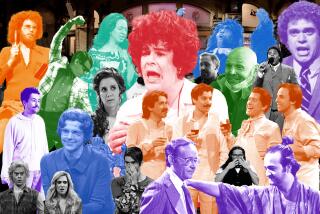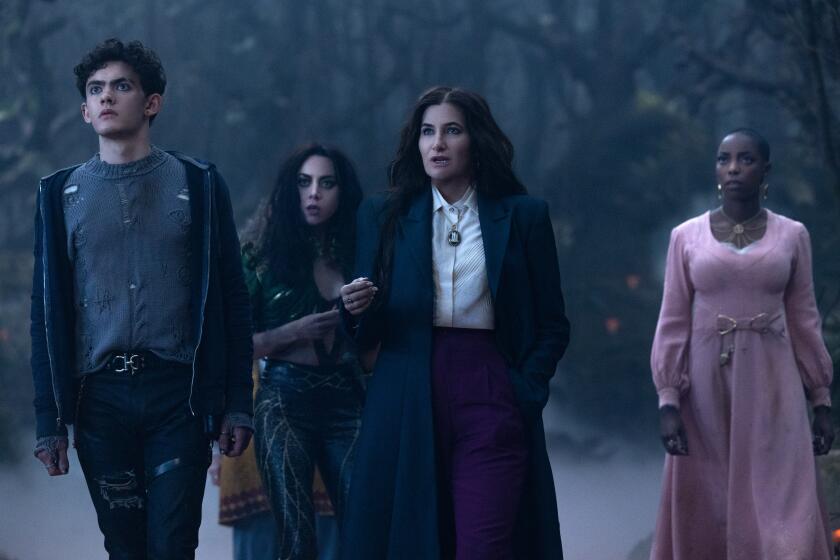‘FACTWINO’: ZAPPING WITH ZIP
It’s a bird. It’s a plane. It’s a bum. It’s, as one character observes, “the old colored fellow in the funny-looking suit.”
It’s FACTWINO, blasting out of the street on the brassy, jazzy currents of the San Francisco Mime Troupe band to clash with the greatest, biggest, most insidious enemy he’s ever faced in his life, drunk or sober--the massive, two-headed ARMAGEDDONMAN!!!
Aaaarrrrgh!!!
SEE the angelic bag lady give Factwino his magic power and, with it, the stern injunction, “You booze it and you lose it”!
SEE Factwino zap the forces of ignorance with his arsenal of facts!
SEE Factwino battle oblivion and doubt to inspire his people with the message of their right to choose!
BLAM! POW! THWAP!
“Factwino: The Opera,” opening next Fridayat the Variety Arts Center, is the latest apotheosis of the San Francisco Mime Troupe’s funky, exuberant, agitprop theater, which, over its 25-year history, has resisted the lure of theatrical gentrification and always insured that its message, however blunt, never outweighed buoyancy of spirit.
Unlike most other collectives with counterculture roots, the troupe has been scrupulous about not succumbing to self-righteousness, even if its messages can be simplistic. Its roots are classic commedia dell’arte, where artful fun is the premium and things are never allowed to get too complicated.
The troupe always labors to bring home serious social and political themes, but they’re expressed with a raffish cartoonish energy, witty portrayals and costumes, and--not least--inspired musicianship.
Two representatives recently took a post-performance meal at a restaurant near the Victoria Theatre, where the troupe holds forth when it’s not on the road--or in the parks. Composer-songwriter Bruce Barthol, 37, plays bass guitar and has been with the organization since 1972. Before that he had been a musician with Country Joe and the Fish.
Joan Holden has been with the San Francisco Mime Troupe since 1967 and is principal writer--though roles are very fluid and anyone can wind up doing virtually anything. (“I’m artistic director, when the need arises,” she says. “In other words, when something needs to be picked up, I pick it up.”)
Barthol has a heavy, restless, brooding manner reminiscent of the young Richard Burton. Holden is spare and poised and possesses an easy elegance. Both are originally from Berkeley.
“I’m a floating spokesman,” Barthol said. “Some people’s forte is talking theory, and some not. Anybody can speak for the company--though maybe some people shouldn’t.” He glanced slyly at Holden.
“The troupe started in 1959 out of the San Francisco Actors Workshop,” Holden said. “It was first called the R. G. Davis Mime Troupe, after its director. He was the kind of person who wanted to do everything, which eventually created a lot of friction in the company. He says now that he was kicked out. But that isn’t true--we wanted him to stay; we just wanted him to listen to us.”
Barthol made a subtly disparaging comment about Davis, an outspoken man who has written a book about the troupe. Holden looked sharply at Barthol. “We learned a lot from him,” she said.
“We’re a collective,” Barthol said. “It’s no birdbath--trying to meet production needs, making ends meet. Joan writes two plays a year. Once a show opens, we keep redoing it.”
“You wouldn’t expect our musicians to put up with what they put up with,” Holden said. “I think of them as people who live on another level, late at night, in a hyperkinetic scene. These guys could be well-paid elsewhere.” She turned to Barthol. “Why do you think they do it?”
“It’s reasonably pleasant and rewarding,” Barthol replied. “The mime troupe raises questions that people haven’t dealt with before. Some of us came in from political interests.”
“The distinguishing element is the political element,” Holden agreed. “Everything we do comes from wanting to change the world.”
“But we’re not ideologues,” Barthol said. “That’s why we do comedy.”
Barthol described his pilgrimage from the UC Berkeley of the mid-’60s Free Speech days, which came full circle when he returned from a rock career and a lengthy stay in London to become a political activist in San Francisco with the troupe. (He appeared in a show called “The Bebe Rebozo Rolling Rep,” which was hired by the McGovern Committee.)
Holden remembers that period as one in which a $50-a-week salary for a troupe member was considered “a princely sum. The idea was to get people to register and vote. We traveled seven days a week, from Sonoma to Monterey. I found out that winos are Democrats and alcoholics are Republicans.”
On the evolution of Factwino, she said:
“Factwino was born in 1981 as a waitress who had the human frustration of not being able to respond to arguments she knew were wrong. She always longed for that power. The motto then was, ‘If you abuse it, you lose it.’ But the actress we had then, Andrea Snow, got pregnant. We wanted to do it again; we wanted people to think instead of spouting information. Chabaka had joined the company. Somebody said that he did a great wino. ‘Aha!’ I said.”
“The first production was a total disaster,” Barthol said.
“Dead silence,” Holden said.
“A friend said it would be a hit,” Barthol said. “But a lot of mime troupe veterans were in the audience. They were very hard to please.
“Still, the show’s development is tied to the increasing power of the right wing. ‘Factwino: The Opera’ is our response to the ‘80s. First it was ‘Factwino Meets the Moral Majority’; then it was ‘Factwino vs. Armageddonman’; now this. We dealt with economics, the social agenda and now the ultimate question--nuclear war.”
“The style is in broad strokes,” Holden said, “cartoon characters expressing real problems with fast movement, fast dialogue. We got the idea from doing Brecht’s ‘The Mother’ in 1963.”
“We did the American premiere of Dario Fo’s ‘We Can’t Pay, We Won’t Pay,’ ” Barthol said.
“The troupe survives because it wasn’t engendered by the Vietnam War,” Holden said. “It was engendered by San Francisco theater, which has roots in the labor tradition and goes back to the Gold Rush days.”
“It’s difficult to take risks,” Barthol said. “But not as difficult as boring yourself.”
“Somebody came up to me recently and said, ‘I congratulate you,’ ” Holden said. “ ‘For keeping it going?’ I asked. ‘No, for letting it change.’ ”
More to Read
The biggest entertainment stories
Get our big stories about Hollywood, film, television, music, arts, culture and more right in your inbox as soon as they publish.
You may occasionally receive promotional content from the Los Angeles Times.










